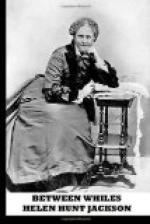Her voice was sweet as a lark’s and as pure, and her passionate love for music a gift in itself. “It would be a sin not to cultivate it,” said Mrs. Allan to her husband, “even if she never sees another piano than mine, nor has any other time in her life except these few years to enjoy it; she will always have had these, and nothing can separate her from her voice.”
And so it came to pass that when, at sixteen, Little Bel went to Charlottetown for her final two years of study at the High School, she played almost as well as Mrs. Allan herself, and sang far better. And in all Isabella McDonald’s day-dreams of the child’s future, vague or minute, there was one feature never left out. The “good husband” coming always was to be a man who could “give her a piano.”
In Charlottetown Bel found no such friend as Mrs. Allan; but she had a young school-mate who had a piano, and—poor short-sighted creature that she was, Bel thought—hated the sight of it, detested to practise, and shed many a tear over her lessons. This girl’s parents were thankful to see their daughter impressed by Bel’s enthusiasm for music; and so well did the clever girl play her cards that before she had been six months in the place, she was installed as music-teacher to her own schoolfellow, earning thereby not only money enough to buy the few clothes she needed, but, what to her was better than money, the privilege of the use of the piano an hour a day.
So when she went home, at the end of the two years, she had lost nothing,—in fact, had made substantial progress; and her old friend and teacher, Mrs. Allan, was as proud as she was astonished when she first heard her play and sing. Still more astonished was she at the forceful character the girl had developed. She went away a gentle, loving, clinging child; her nature, like her voice, belonging to the order of birds,—bright, flitting, merry, confiding. She returned a woman, still loving, still gentle in her manner, but with a new poise in her bearing, a resoluteness, a fire, of which her first girlhood had given no suggestion. It was strange to see how similar yet unlike were the comments made on her in the manse and in the farmhouse by the two couples most interested in her welfare.
“It is wonderful, Robert,” said Mrs. Allan to her husband, “how that girl has changed, and yet not changed. It is the music that has lifted her up so. What a glorious thing is a real passion for any art in a human soul! But she can never live here among these people. I must take her to Halifax.”
“No,” said Mr. Allan; “her work will be here. She belongs to her people in heart, all the same. She will not be discontented.”
“Husband, I’m doubtin’ if we’ve done the right thing by the child, after a’,” said the mother, tearfully, to the father, at the end of the first evening after Bel’s return. “She’s got the ways o’ the city on her, an’ she carries herself as if she’d be teachin’ the minister his own self. I doubt but she’ll feel herself strange i’ the house.”




